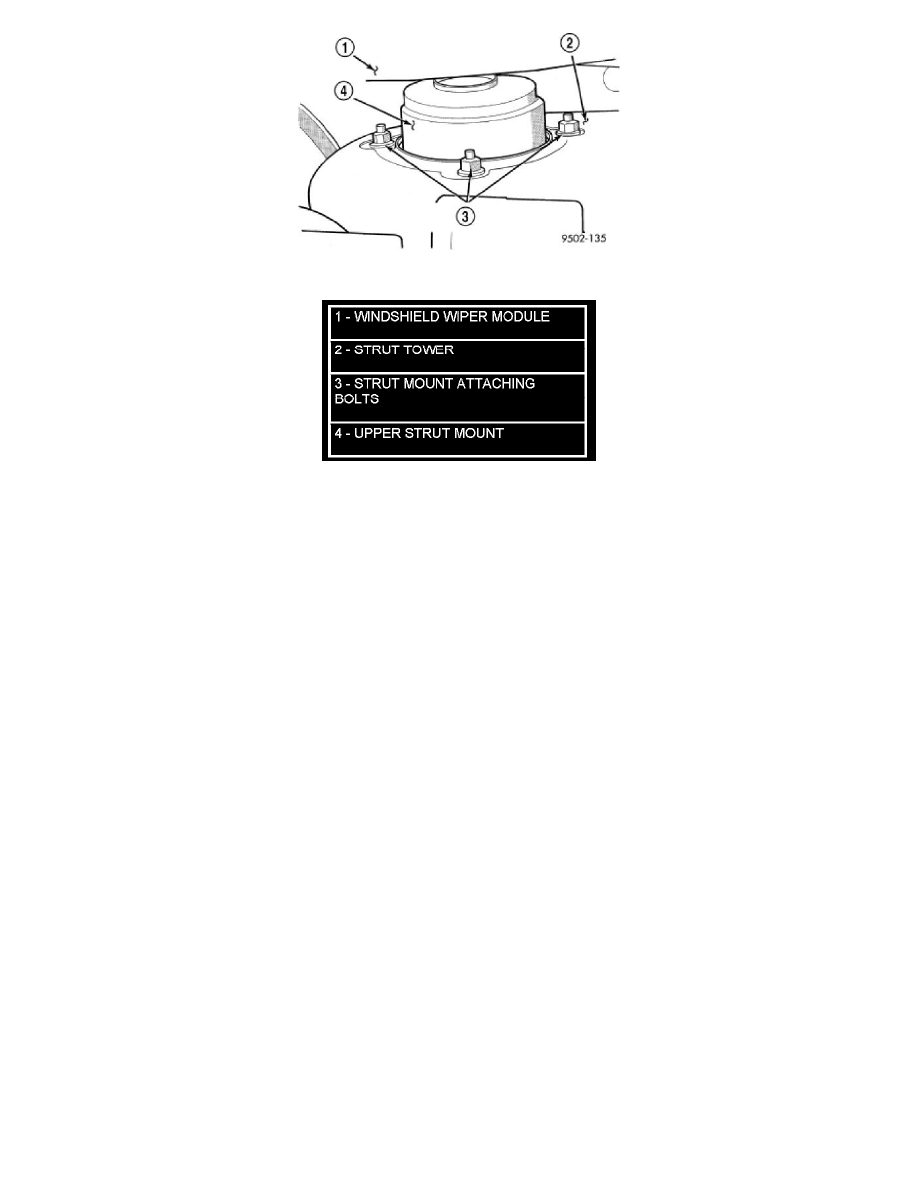Grand Caravan V6-3.8L VIN L (2007)

Figure 4 Strut Assembly To Strut Tower Attaching Nuts (Typical)
8. To disassemble the strut assembly, refer to Suspension Front Strut Disassembly.
Installation
INSTALLATION
CAUTION: Front strut coil springs are side-oriented. When installing a strut assembly, make sure the strut being installed has the correct coil
spring for that side of the vehicle. Do not interchange the two sides.
1. Install strut assembly into strut tower, aligning and installing the three studs on the upper strut mount into the holes in shock tower. Install the three
upper strut mounting nuts (with washers) (Figure 3). Then using a crow foot wrench, tighten the three nuts to 28 Nm (250 in. lbs.).
CAUTION: The steering knuckle to strut assembly attaching bolts are serrated and must not be turned during installation. Install nuts
while holding bolts stationary in the steering knuckles.
NOTE: The strut clevis-to-steering knuckle bolts are installed differently on each side of the vehicle. Left hand side bolts are to be
installed from vehicle rear to front. Right side bolts are to be installed from vehicle front to rear.
2. Align strut assembly with steering knuckle. Position arm of steering knuckle into strut assembly clevis bracket. Align the strut assembly clevis
bracket mounting holes with the steering knuckle mounting holes. Install the 2 strut assembly to steering knuckle attaching bolts (Figure 1). If
strut assembly is attached to steering knuckle using a cam bolt, the cam bolt must be installed in the lower slotted hole on strut clevis
bracket. Tighten the strut clevis-to-steering knuckle attaching bolts to 81 Nm (60 ft. lbs.) plus an additional 1/4 (90°) turn after the specified
torque is met.
3. Install the stabilizer bar link mounting stud through the bracket on the strut assembly (Figure 4).
CAUTION: When installing the nut on the mounting stud of the stabilizer bar link, do not allow the stud to rotate in it's socket. Hold the
stud from rotating by placing an open-end wrench on the flat machined into the stud (Figure 4).
4. Hand thread the nut on the end of the stabilizer bar link stud. Hold the stud from turning by placing an open-end wrench on the flat machined into
the link's mounting stud, then tighten the nut while holding the wrench in place (Figure 4). Tighten the nut to 88 Nm (65 ft. lbs.).
5. Install the hydraulic brake hose and speed sensor cable routing brackets on the strut assembly brackets (Figure 2). Tighten the routing bracket
attaching bolts to 13 Nm (10 ft. lbs.).
6. Install the wheel/tire assembly on the vehicle.
7. Install and tighten the wheel mounting stud nuts in proper sequence until all nuts are tightened to half the specified torque. Then repeat the
tightening sequence to the full specified torque of 135 Nm (100 ft. lbs.).
8. Lower the vehicle.
9. Perform wheel alignment as necessary.
